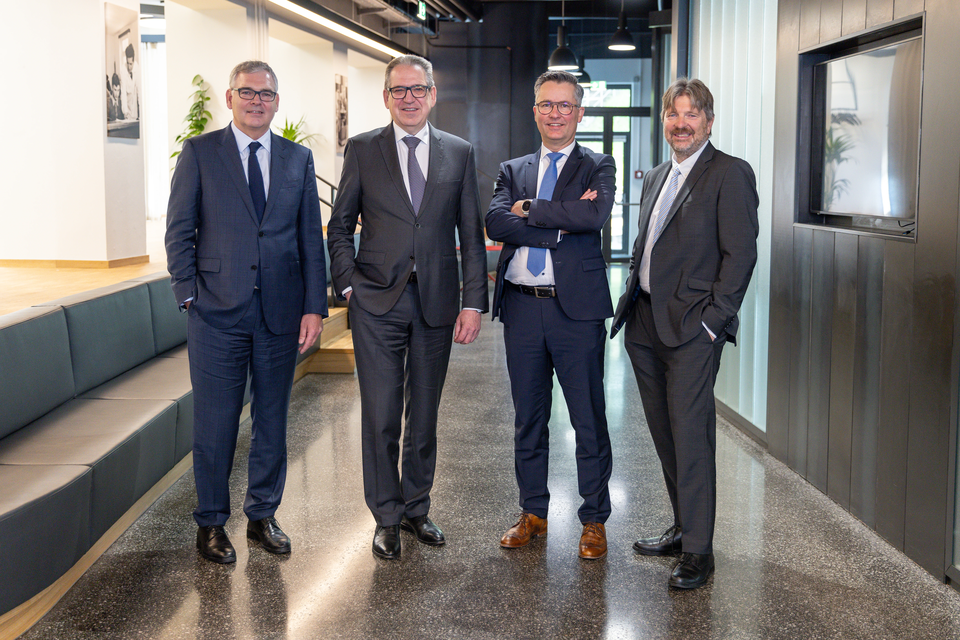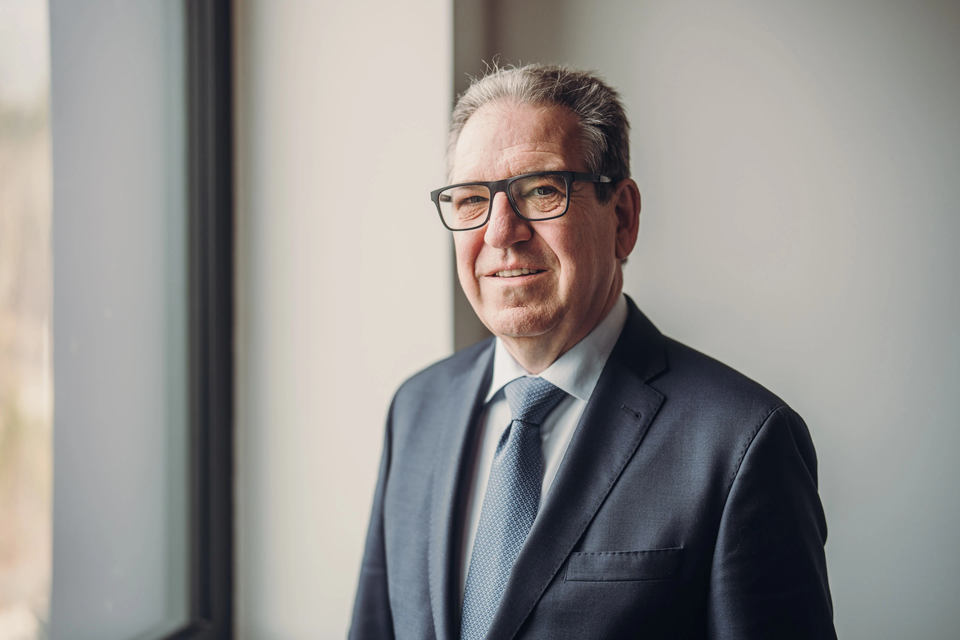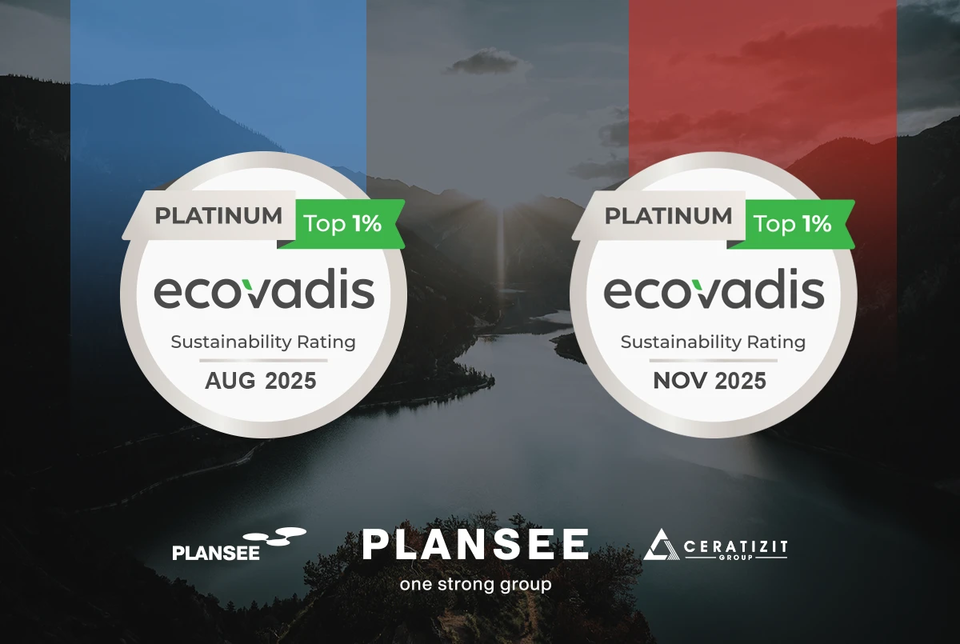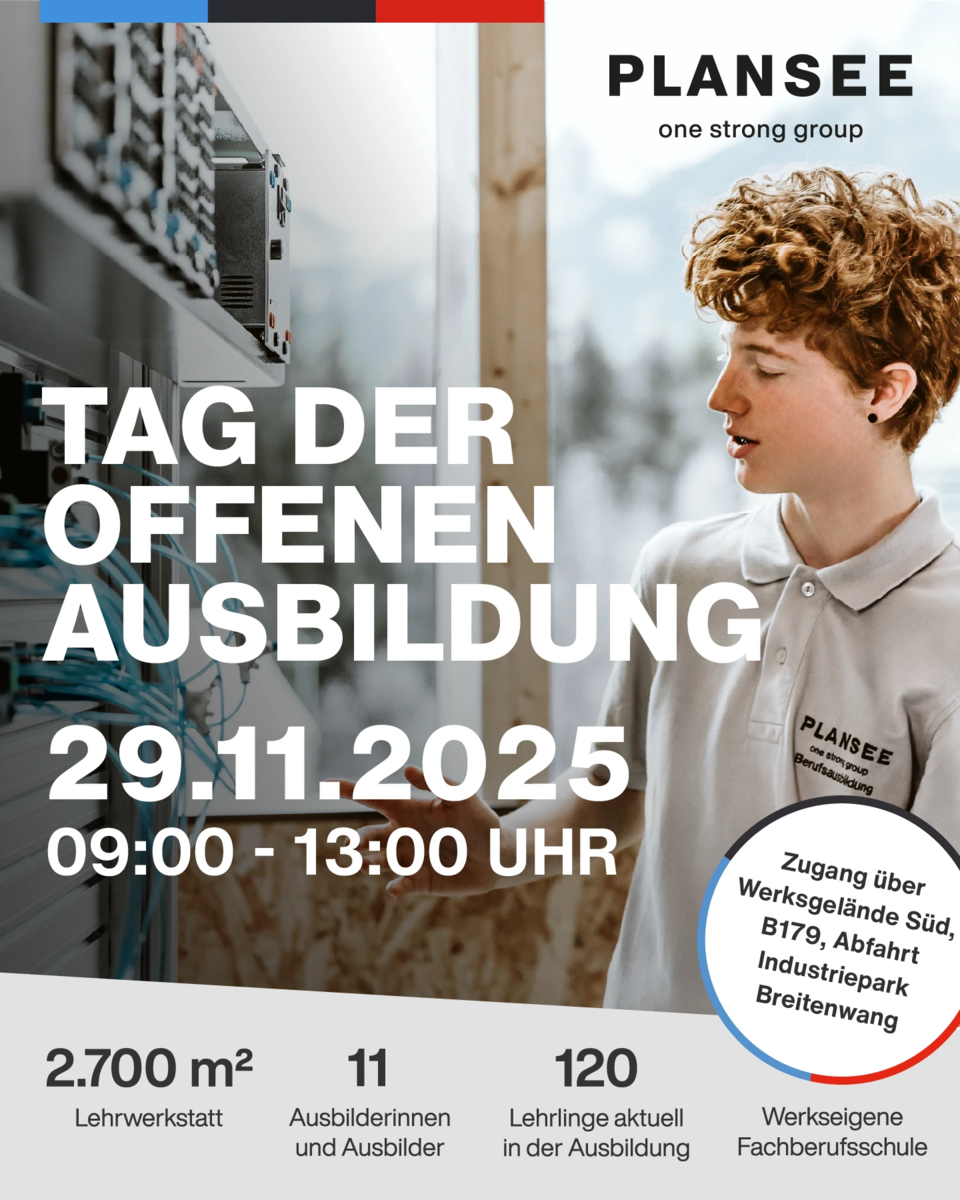Fiscal Year 2024/25 & Outlook: Strong thanks to secure raw material supply
Breitenwang/Reutte, 3 July 2025 – In a challenging business environment, the Plansee Group delivered robust performance the past fiscal year. Thanks to its secure supply of raw materials, local production in all major economic regions, and customers in a wide range of sales markets, the company considers itself well-positioned for the future.
In the past fiscal year 2024/25, demand from industries and economic regions varied greatly: While the business climate continued to cool, particularly in Europe, there were signs of a slight recovery in China. Demand from sectors such as mechanical engineering, the automotive industry, and the semiconductor industry remained modest. By contrast, consumer electronics and the aerospace industry provided tangible growth impetus.
“We worked on our operational performance and successfully implemented price increases. However, this did not fully offset the effects of declining capacity utilization,” said Karlheinz Wex, Chairman of the Executive Board of the Plansee Group, at the annual media conference at the headquarters in Reutte/Austria. “Given these conditions, we delivered robust performance.” The four percent decline in sales volume led to a one percent drop in sales, to 2.25 billion euros, compared to the previous year. The equity ratio rose to 59 percent (previous year: 57 percent).
Leading tungsten supplier
The supply security of tungsten raw materials was further increased. To this end, new business models for the purchase and acceptance of returned tungsten scrap were developed, successfully tested on the market, and launched. At the same time, the Sangdong mine in South Korea will start mining and delivering tungsten concentrates in the coming months. The Plansee Group has secured the financing for this ambitious project with long-term offtake agreements. “With these measures, we have established a secure supply of tungsten in recent years and are further expanding our position as the leading tungsten supplier in the Western world,” said Karlheinz Wex.
Investments in capacity and facilities
Investment priorities included capacity expansions at production plants in Bulgaria, France, Poland and Germany. In Austria, projects have been launched to decarbonize industrial furnaces and automate the production of tungsten and hard metal products. In China and India, machinery for new products in the medical technology, semiconductor, and energy transmission industries has been installed. Further investments were made in new machinery and equipment as well as in product and process developments. The Plansee Group's investment and innovation volume amounted to 249 million euros during the past fiscal year, with 99 million euros being spent on product and process development.
Digitalization of quotation and procurement processes
The Ceratizit business area, which specializes in carbide tools, has acquired a minority stake in Spanflug Technologies GmbH. The Munich-based company operates a platform that automates and simplifies the procurement process for CNC-turned and milled parts.
CO₂ reduction on track
The Plansee Group has published its second sustainability report for the past fiscal year. “We continued to focus on reducing our carbon footprint and recycling our valuable molybdenum and tungsten metals,” said Karlheinz Wex. The Group's corporate carbon footprint was reduced by 26 percent to 313,000 tons of CO₂e compared to the 2020/21 base year. A significant factor is the procurement of electricity from renewable sources, the share is 97 percent across the group.
The method presented last year for calculating the greenhouse gas emissions caused by the manufacture of a product (product carbon footprint) has been further developed in close cooperation with the German Engineering Federation (VDMA). It is expected to become an international industry standard. “This underlines our pioneering role as a driving force for sustainable change in our industry,” said Karlheinz Wex.
Number of employees declining
The number of employees decreased worldwide to 10,890 – a reduction of three percent compared to the previous year, which was due to natural fluctuation (retirement, resignations) at most sites. Particular attention was paid to occupational safety. “We want every employee to go home safe and sound after work,” said Karlheinz Wex. To ensure this, the company took numerous measures to prevent and avoid accidents at work.
Outlook
The Executive Board does not expect the economic environment to improve in the current fiscal year and anticipates growth momentum in only a few select industries. Overall, development is expected to remain at the previous year's level. Competitiveness is declining at the Central European sites due to ongoing high energy, personnel, and bureaucratic costs. The closure of the German Ceratizit sites in Besigheim and Empfingen, announced in March, is to be completed by the end of 2026. Corresponding social compensation plans are currently being developed. In order to be able to offer locally manufactured products to customers in all economic regions, further investments in India and the USA are planned.
Karlheinz Wex does not expect the global economy to recover until the end of the fiscal year at the earliest. “In the meantime, we will continue to work on increasing the resilience of our organization, developing new products with our customers, achieving excellence in production, sales, and administration, and further developing and optimizing processes. Once we have completed these tasks, we will be well-positioned for the next economic upturn,” said the Chairman optimistically.
| 2022/23 | 2023/24 | 2024/25 | |
|---|---|---|---|
| Revenue | 2,35 billion euros | 2,28 billion euros | 2,25 billion euros |
| Employees | 11.445 | 11.208 | 10.890 |
| Workplace accidents per 1 million working hours | - | 7,3* | 7,6* |
| Investments | 169 million euros | 209 million euros | 150 million euros |
| R&D expenses | 85 million euros | 88 million euros | 99 million euros |
| New product share | 41 % | 38 % | 30 % |
| Equity ratio | 50 % | 57 % | 59 % |
| Tungsten recycling rate | 75 % | 90 % | 88% |
| Molybdenum recycling rate | - | 32 %** | 26 %** |
| CO2 footprint (Corporate Carbon Footprint)** | - | 343.000 tons CO2e | 313.000 CO2e |
| Share of electricity from renewable sources | - | 92 % | 97 % |
Photos: Parsch Michael, Andi Mayr
Media contact
Dénes Széchényi
Head of Group Communications
Nr. +43-5672-600-2243
Mobile +43-664-81 52 598
denes.szechenyi@plansee-group.com
About the Plansee Group
With its Plansee High Performance Materials and Ceratizit business areas and its investment in Molymet, the Plansee Group is one of the world's leading powder metallurgy companies.
The Plansee Group specializes in products made of molybdenum and tungsten materials, covering the entire value chain – from the processing of raw materials (from scrap or ore concentrates) to customized tools and components.
The product portfolio includes more than 100 000 different products and tools, which are used in the production of everyday high-tech devices such as smartphones as well as sustainable and efficient solutions for mobility, energy supply and industrial production.
With 11 208 employees, the Plansee Group generated consolidated sales of 2.28 billion euros in the fiscal year 2023/24.
The fiscal year ends on the last day of February.





